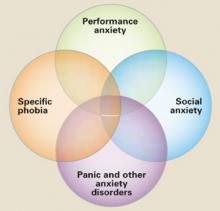The violin is slippery in my grasp. I hear the thud of my foot tapping, but the tempo feels wrong. I’m aware of my chest pounding, a lump in my throat, and heat rising from my face. Everyone is watching me, waiting for me to make a mistake.
Why can’t I stop my hand from trembling? I can only watch as the bow jumps noisily across the strings. I should have practiced more. My mind goes blank, and I miss the page turn.
Silence. I blink, and the lights blind me as the applause comes, thankfully, and I exhale and run off the stage as the curtain closes.
Well-known performing artists—Sir Laurence Olivier, Kim Basinger, Peter O’Toole, Richard Burton, Barbra Streisand, and Luciano Pavarotti —have described bouts with acute stage fright. Performance anxiety can occur with acting, singing, or playing a musical instrument, and with nonartistic performances such as public speaking, oral examinations, competing in sporting events, sexual activity, using public restrooms, or being watched while doing a task such as surgery, eating, or writing.2
Like social phobia, performance anxiety probably develops in accomplished artists and not-so-famous individuals because of a mélange of genetic factors, innate temperament, parental influences, conditioning events, and cognitive influences.3
NORMAL VS. ABNORMAL FEAR
Performance anxiety is characterized by persisting, distressful apprehension about—or actual impairment of—performance skills to a degree unwarranted by the individual’s aptitude, training, and preparation.1 Not all performance anxiety qualifies as a mental disorder; for example, though 85% of the population experiences discomfort about public speaking,4 this anxiety does not impair most people’s ability to function.
Mild to moderate anxiety is normal and motivating in performances.5 However, anxiety’s effect on performance does not follow a bell-shaped curve, wherein moderate anxiety promotes optimal performance.6 Instead, a catastrophic model is more accurate: increasing anxiety is helpful until a certain threshold is reached, then performance plunges.7
Diagnostic criteria. DSM-IV-TR describes performance anxiety as a form of social phobia (or social anxiety disorder) characterized by marked and persistent fear of social or performance situations in which embarrassment or humiliation might occur. Approximately 13% of adults experience social phobia,8 and about 2% suffer from severe discrete performance anxiety.9
Performance anxiety does not completely overlap with social phobia, however. Test-taking anxiety and writer’s block, which can occur in a nonpublic context, do not fit neatly into the social phobia category.2 Thus, some performance anxiety forms are better grouped as another type of anxiety disorder, such as specific phobia (Figure).
Figure Performance anxiety features overlap with other anxieties
Performance anxiety is not easy to categorize. It is situational anxiety that occurs in a public context and overlaps with but does not entirely match diagnostic criteria for specific phobia, social anxiety, or panic disorder and generalized anxiety.
DIFFERENTIAL DIAGNOSIS
Social anxiety? Ask the patient about all situations that provoke anxiety to differentiate between:
- discrete performance anxiety (1 or 2 performance situations that provoke anxiety)
- and generalized social anxiety (3 or more situations that provoke anxiety).9
Individuals with “trait” anxiety may exhibit innate shyness and are considered to have generalized social phobia. Those with “state” anxiety experience anxiety in specific situations or circumstances and are more aptly described as having discrete performance anxiety.10 Whereas persons with social phobia may avoid the feared activity without inner conflict, those with performance anxiety are committed to performing the activity and are distressed when unable to perform.9
Specific phobia? A specific phobia is a circumscribed fear of a specific object, situation, or activity from which a grim outcome is feared. Specific phobia usually has no performance aspect or fear of embarrassment or failure.
Some clinicians consider certain performance anxieties—such as writer’s block, test-taking anxiety, paruresis, and even fear about sexual performance—to be specific phobias. Because performance anxieties and phobias share some cognitive and behavioral components, their treatments are similar and use of medication is controversial.
General medical condition? Perform or refer the patient for a thorough medical evaluation before you diagnose performance anxiety, as endocrine, cardiovascular, respiratory, and circulatory abnormalities can mimic or exacerbate anxiety disorders. Also consider substance abuse or withdrawal as possible causes of anxiety.
PATIENT EVALUATION
Family history. Individuals with social anxiety often report a family history of generalized social anxiety, panic disorder, or major depressive disorder.3 Similar findings seem plausible for persons with discrete performance anxiety, although comparable family history data have not been reported.
Cognitive symptoms. Four cognitive distortions are common in persons with social phobia (Table 1).11 These negative thoughts are presumably the same for performance anxiety, at least when it is a sub-type of social phobia.


